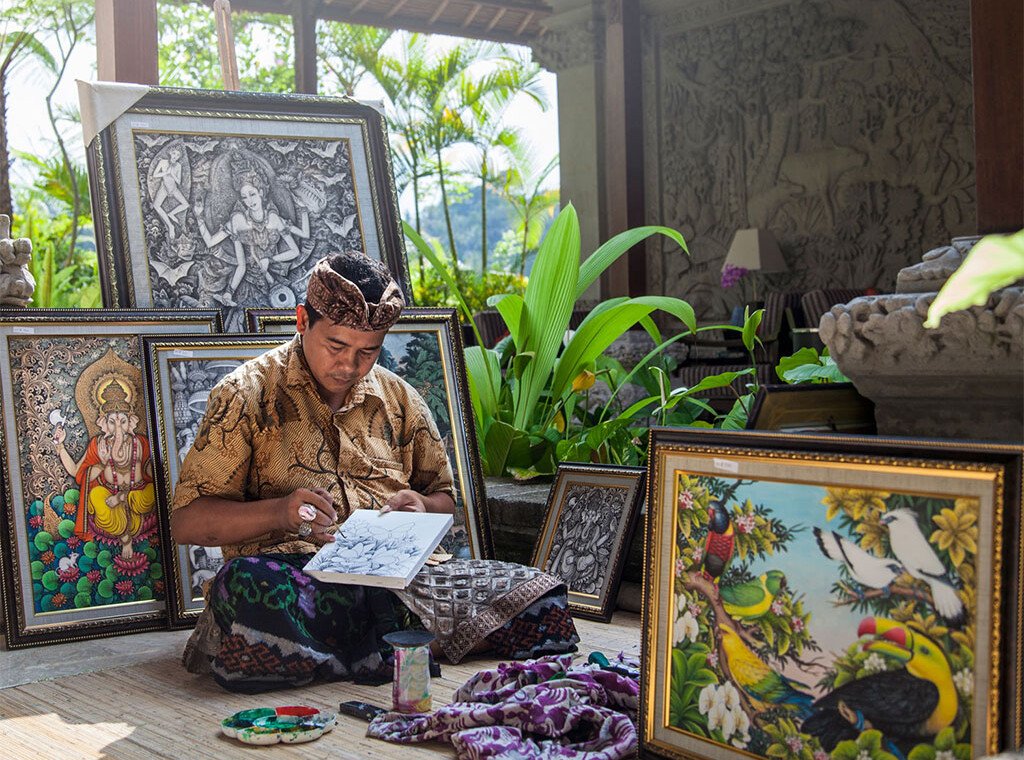Nestled in the verdant highlands of Bali, Ubud is considered the island’s spiritual and cultural heart. Beyond its lush rice terraces and arty cafés, Ubud offers profoundly immersive experiences that connect travelers to Balinese life, beliefs, and traditions. Join us on a captivating journey through six cultural highlights—each carefully curated to let you feel the pulse of Bali in an unforgettable way.
1. 🏯 Dawn Purification at Tirta Empul Temple
Why It Matters
Tirta Empul is one of Bali’s holiest water temples, believed to cleanse both body and spirit. Participating in the ritual with local worshippers is an intimate entry into Bali’s vibrant spirituality.
What to Expect
Set your alarm—dawn at Ubud in July can be misty and reverent. Arrive before sunrise, and you’ll find purists, families, and day‑trippers gathering at the central spring pool. Guides are available, but locals often welcome participation. You’ll don a wrapped sarong and utteng (headcloth), walk behind offertory stalls, and approach the fountain in a calm, meditative queue.
The Ritual
As priests chant, you’ll gently move under each water jet, repeating prayers silently or aloud. Each of the thirteen spouts represents a stage of purification—body, soul, and emotion. Take your time, breathe deep, and allow cold water to shock—and awaken—you.
Cultural Insight
More than just a cleansing ritual, Tirta Empul embodies Balinese Hindu values: Tri Hita Karana (harmony between god, man, and nature). Locals believe that purified individuals contribute to universal balance and wellbeing. Participating honors this worldview and forges connection.
2. 🎭 Traditional Kecak Fire Dance at Bukit Sari Temple
The Spectacle
Picture a circle of 60 men chanting “cak‑cak‑cak” in trance, hands raised, voices rising into the jungle night. Women move gracefully in gold‑trimmed kebaya, enacting Ramayana scenes. Surrounding them, swaying bamboo torches outline the stage. This is the iconic Balinese Kecak.
Why It Resonates
Performed for over 80 years at Bukit Sari (just outside Ubud), the dance is a masterwork of communal energy. The vocal percussion is mesmerising—raw, hypnotic, alive.
Attending Tips
– Arrive 30+ minutes early to pick a good seat.
– Bring a light shawl—nights can chill, even near fire.
– Silence phones; immerse in the chant.
– Support local performers: photographers and CDs are often sold afterward, but donations are welcome.
Take‑Home Moment
Kecak’s unity—the men’s collective rhythm, the “cacophony” perfectly synchronized—is a living testament to gotong royong (mutual cooperation), central to Balinese society.
3. 🥥 Village Cooking Class & Market Walk
A Feast for the Senses
Ubud’s back‑lane markets burst with color: deep‑red chilies, papery turmeric, bundles of lemongrass, and sticky rice in banana leaf. A cooking class offers a grounded, interactive dive into local ingredients, recipes, and daily rhythms.
How It Works
Early morning, your local guide leads you through stalls at Ubud Market. You’ll learn to spot the best produce, bargain as the locals do, and ask questions—using hands, smiles, Bahasa phrases.
Back in the outdoor kitchen (perhaps thatched-roof, open-air), you’ll master dishes such as:
- Lawar (minced coconut‑meat‑spice salad)
- Ayam Betutu (slow‑cooked spicy chicken in banana leaf)
- Jaje Lak Lak (Balinese coconut‑sugar pancakes)
Each step involves hands-on prep—an awakening of smell, touch, taste.
Why It Resonates
Eating is sacred in Bali; food connects families, offerings, prayers. You’re not just cooking—you’re stepping into a daily ritual woven with reverence. And the best part: you eat your hard‑earned meal—and perhaps make new friends at the shared table.
4. 🎨 Balinese Painting & Silver‑Filigree Workshop
Art That Breathes
Ubud’s artistic legacy is rich: from traditional Wayang painting to experimental modernism. Engage in it yourself—feel the brush glide, the silverwork shine.
Workshop Highlights
Choose from:
- Wayang Painting – stylized puppets, mythic hues, rice-paper composition.
- Silver Filigree – twisting fine wire over fiery burners to create earrings, pendants.
- Lurik Weaving Session – rhythmic shuttle patterns using cotton dyed stripes.
Sessions begin with a village tour—visit a family studio in Penestanan or nearby, tea in hand, and discuss tools, patterns, spiritual symbolism.
Cultural Insight
Balinese art isn’t just aesthetic—it’s spiritual. Traditional patterns exist to ward off evil, invite prosperity. Creating under a master’s guidance is both skill‑building and soul‑touching.
5. 🧘 Sunrise Yoga & Chakra Ceremony in the Rice Terraces
Rise with the Sun
Ubud’s terraces (Tegalalang, Campuhan) are often filled with sprawling yoga platforms at sunrise. Here, yoga meets ceremony—a fusion of breath, body, landscape, and intention.
What Happens
With the sky still gold-hued, you take your mat among morning mist. A Balinese yoga instructor guides a flow session, ending in seated meditation and small Chakra alignment ritual—flowers, water, scented oils. Perhaps you link your intention to Saraswati (wisdom goddess) or Dewi Sri (rice goddess).
Why It Matters
This isn’t just wellness tourism—it’s a living tradition. Balinese ceremonies honor the same energies that tend terraced paddies centuries-old. You don’t just do yoga—you become part of a land‑blessed ritual.
6. 🕯️ Offerings & Evening Melukat Ceremony
An Evening with Soul
A melukat is a purification ritual—physically and spiritually. Done at home or temple after sunset, it combines prayers, incense, pulsing gongs, and physical touch via holy water.
The Experience
Share in a local family’s compound: you’ll be seated cross-legged among women weaving offerings (canang sari). A priest chants, you hold flowers, receive drops of holy water on forehead and shoulders, and ring a small gong. The sound—resonant and low—warms the chest and heart.
Cultural Insight
Evening melukat is deeply personal. It’s used during rites of passage, times of stress, for healing. As witness or full participant, you’re touching Balinese belief in unseen energies, spirits, and the protective power of ritual.
Putting It All Together: A Cultural Journey Map
| Experience |
Time of Day |
Setting |
Cultural Lens |
| Dawn Purification |
Early Morning |
Temple Pools |
Spiritual Harmony (Tri Hita Karana) |
| Kecak Dance |
After Sunset |
Hilltop Temple |
Community & Epic Myth |
| Market + Cooking |
Morning |
Village Market + Kitchen |
Daily Ritual & Nourishment |
| Art Workshop |
Daytime |
Artist Studio |
Mythical Symbol & Craft |
| Sunrise Yoga |
Dawn |
Rice Terrace |
Land‑ritual, Spiritual Flow |
| Evening Melukat |
At Dusk |
Family Temple |
Personal Purification |
Practical Tips & Cultural Etiquette 🧭
- Dress Respectfully: Bring a sarong and sash for temple visits. Many classes provide them.
- Ask Before You Photograph: Especially in ceremonies—professionals are fine, but don’t be intrusive.
- Mind the Tempo: Balinese culture moves mindfully, not at tourist pace. Allow extra time.
- Support Local: Prefer family‑run studios, local homestays, and market‑based classes.
- Learn Basic Phrases: “Om Swastiastu” (Hello/blessing), “Terima kasih” (Thank you).
Itinerary Outline (4 Days)
- Day 1: Dawn cleansing at Tirta Empul → Breakfast at Ubud Market → Art workshop in Penestanan → Kecak dance tonight.
- Day 2: Early‑morning yoga in the terraces → Cooking class → Afternoon at Monkey Forest or rice‑terrace walk.
- Day 3: Market tour for grocery‑style ingredients → Visit a village temple → Evening melukat ceremony.
- Day 4: Optional repeat favorite, or venture to local wood‑carving villages (Mas, Batuan), then farewell dinner and reflection.
Why These Experiences Matter
Together, these six activities span the spiritual, artistic, communal, culinary, personal, and ceremonial aspects of Balinese life. You’ll move beyond sightseeing; you’ll engage senses, beliefs, blessings, and daily rhythms. It’s not just travel—it’s transformation, fueled by rituals ancient and alive.
Let each dawn, chant, brush‑stroke, and offering awaken something within you. Feel the pulse—vibrant, humble, profound—of Bali, through the beating heart of Ubud.
Lasting Tips & Final Thoughts
- Be Present: Turn phones off during rituals; soak in sensory richness.
- Remain Humble: If you can’t fully participate, you can still observe respectfully.
- Connect: Ask about meaning; make eye contact; share a smile.
- Take Purpose, Not Trinkets: Bring home intention, not souvenirs.
- Leave Lightly: Respect land, waste, wildlife. Treat rice terraces like sacred spaces.
These experiences aren’t mere tick‑boxes—they’re invitations. Invitations to listen, to join, to remember you are part of a living tradition, carried forward by communities who see you first as a guest, then a friend.










Join The Discussion